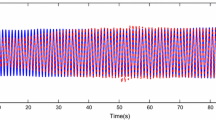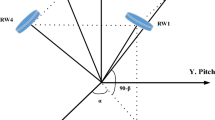Abstract
In modern aerospace engineering, fault-tolerant control (FTC) has become increasingly vital for maintaining spacecraft functionalities, including attitude control. The attitude determination module incorporates data from different sensors. Star trackers and gyroscopes provide attitude and angular rate measurements affected by noise. To minimize the latter, the so-called gyro-stellar estimator exploits optimal state estimation such as Kalman filters. However, gyros are subject to drifts which beyond some limits could affect estimator convergence. In this paper, a hybrid supervision scheme is proposed for attitude control affected by gyroscope faults. The data-driven fault detection and identification (FDI) module localizes and coarsely identifies the emerging drift. Then, the supervision system reconfigures the gyro-stellar estimator and updates the controller gains to guarantee FTC capability. The final hybrid system ensures attitude control function until fine-tuning is performed by attitude determination and control engineers. Simulation results with in-orbit data validate the effectiveness of the proposed approach.













Similar content being viewed by others
Data availability
Considering that the case study in this paper is related to real space mission, data (injected fault and reference trajectory) will be made available upon reasonable request to the corresponding author.
References
Landis Markley, F., Crassidis, J.L.: Fundamentals of Spacecraft Attitude Determination and Control. Springer, New York (2014)
Pasquier, H., Cruzen, C.A., Schmidhuber, M., Lee, Y.H.: Space Operations: Inspiring Humankind’s Future. Springer, Cham (2019)
Tafazoli, M.: A study of on-orbit spacecraft failures. Acta Astronaut. 64(2–3), 195–205 (2009). https://doi.org/10.1016/j.actaastro.2008.07.0
Zolghadri, A., Henry, D., Cieslak, J., Efimov, D., Goupil, P.: Fault Diagnosis and Fault-Tolerant Control and Guidance for Aerospace Vehicles. From Theory to Application. Springer, London (2014)
Henna, H., Toubakh, H., Kafi, M. R., Sayed-mouchaweh, M.: Towards fault-tolerant strategy in satellite attitude control systems: A review. In: Proceedings of the Annual Conference of the PHM Society, Nashville – TN, USA, (2020) https://doi.org/10.36001/phmconf.2020.v12i1.1272
Mehra, R., Rago, C., Seereeram, S.: Autonomous failure detection, identification and fault-tolerant estimation with aerospace applications. In: Proceedings of the IEEE Aerospace Conference (Cat. No.98TH8339), (1998) https://doi.org/10.1109/aero.1998.687904.
Gao, S., Zhang, Z., Zhang, W., He, X., Lu, X.: Fault diagnosis for satellite attitude control system with using extended Kalman filter. In: Proceedings of the 38th Chinese Control Conference (CCC) (2019) https://doi.org/10.23919/chicc.2019.8865903
Byeon, S., Mok, S.-H., Woo, H., Bang, H.: Sensor fault tolerant attitude determination using two-stage estimator. Adv. Space Res. (2019). https://doi.org/10.1016/j.asr.2019.02.007
Li, L., Liu, C., Zhang, Y., Wang, Z., Shen, Y.: Gyroscope fault accommodation based on dedicated Kalman filters. J. Aerosp. Eng. (2019). https://doi.org/10.1177/0954410019861188
Lopez-Encarnacion, E., Fonod, R., Bergner, P.: Model-based FDI for agile spacecraft with multiple actuators working simultaneously. IFAC PapersOnLine (2019). https://doi.org/10.1016/j.ifacol.2019.11.282
Henna, H., Gasmi, E., Toubakh, H., Kafi, M.R., Djemai, M., Sayed-Mouchaweh, M.: Fault tolerant attitude estimation for satellite at low earth orbit. In: 2023 9th International Conference on Control, Decision and Information Technologies (CoDIT), pp. 275–280. IEEE (2023)
Alwi, H., Edwards, C., Marcos, A.: FDI for a mars orbiting satellite based on a sliding mode observer scheme. Proc. Conf. Control Fault Toler. Syst. (2010). https://doi.org/10.1109/systol.2010.5676035
Gao, S., Zhang, W., He, X.: Observer-based multiple faults diagnosis scheme for satellite attitude control system. Asian J. Control (2018). https://doi.org/10.1002/asjc.1873
Gao, Z., Zhou, Z., Qian, M.S., Lin, J.: Active fault tolerant control scheme for satellite attitude system subject to actuator time-varying faults. IET Control Theory Appl. 12(3), 405–412 (2018). https://doi.org/10.1049/iet-cta.2017.0969
Nagesh, I., Edwards C.: A sliding mode observer based FDI scheme for a nonlinear satellite. In: Proceedings of the IEEE International Conference on Control Applications (CCA), Denver, CO, USA (2011) https://doi.org/10.1109/cca.2011.6044485
Kiyak, E., Kahvecioglu, A., Caliskan, F.: Aircraft sensor and actuator fault detection, isolation, and accommodation. J. Aerosp. Eng. (2011). https://doi.org/10.1061/(asce)as.1943-5525.0000052
Nemati, F., Safavi Hamami, S.M., Zemouche, A.: A nonlinear observer-based approach to fault detection, isolation and estimation for satellite formation flight application. Automatica (2019). https://doi.org/10.1016/j.automatica.2019.06.007
Henry, D.: Fault diagnosis of microscope satellite thrusters using H∞/H_ filters. J. Guid. Control Dyn. (2008). https://doi.org/10.2514/1.31003
Lee, K.-H., Lim, S., Cho, D.H., Kim, H.D.: Development of fault detection and identification algorithm using deep learning for nanosatellite attitude control system. Int. J. Aeronaut. Space Sci. (2020). https://doi.org/10.1007/s42405-019-00235-9
Liu, Y., Pan, Q., Wang, H., He, T.: Fault diagnosis of satellite flywheel bearing based on convolutional neural network. In: Proceedings of the Prognostics and System Health Management Conference, Qingdao, (2019) https://doi.org/10.1109/phm-qingdao46334.2019.8942957
Sun, B., Wang, J., He, Z., Zhou, H., Gu, F.: Fault identification for a closed-loop control system based on an improved deep neural network. Sensors (2019). https://doi.org/10.3390/s19092131
Omran, E.A., Murtada, W.A.: Efficient anomaly classification for spacecraft reaction wheels. Neural Comput. Appl. (2017). https://doi.org/10.1007/s00521-017-3226-y
Ke-Qiang, X., Meng, X., Jun, W., Bao-Jun, L., Zhuo, C., Gan-Hua, L.: A new method for satellite control system fault pattern recognition combining multi-classification SVM with kernel principal component analysis. In: Proceedings of the IEEE 3rd Information Technology, Networking, Electronic and Automation Control Conference (ITNEC), (2019). https://doi.org/10.1109/itnec.2019.8729412
Hasan Abbasi, N., Castaldi, P., HamedDehghan, B., Simani, S.: Novel non-model-based fault detection and isolation of satellite reaction wheels based on a mixed-learning fusion framework. IFAC PapersOnline (2019). https://doi.org/10.1016/j.ifacol.2019.11.222
Ibrahim, S.K., Ahmed, A., Zeidan, E.M.A., Ziedan, I.E.: Machine learning techniques for satellite fault diagnosis. Ain Shams Eng. J. (2019). https://doi.org/10.1016/j.asej.2019.08.006
Li, G., Li, J., Cao, Y., Xu, M., Xia, K., Wei, J., Dong L.: The flywheel fault detection based on kernel principal component analysis. In: Proceedings of the IEEE 3rd Information Technology, Networking, Electronic and Automation Control Conference (ITNEC) (2019) https://doi.org/10.1109/itnec.2019.8729163.
Djeziri, M.A., Benmoussa, S., Sayed-mouchaweh, M., Lughofer, E.: Fault diagnosis and prognosis based on physical knowledge and reliability data: Application to MOS field-effect transistor. Microelectron. Reliab. 110, 113682 (2020). https://doi.org/10.1016/j.microrel.2020.11368
Caliskan, F., Aykan, R., Hajiyev, C.: Aircraft icing detection, identification, and reconfigurable control based on Kalman filtering and neural networks. J. Aerosp. Eng. 21(2), 51–60 (2008). https://doi.org/10.1061/(asce)0893-1321(2008)21:2(51)
Chen, F., Wang, Z., Tao, G., Jiang, B.: Robust adaptive fault-tolerant control for hypersonic flight vehicles with multiple faults. J. Aerosp. Eng. 28(4), 04014111 (2015). https://doi.org/10.1061/(asce)as.1943-5525.0000449
Henna, H., Toubakh, H., Kafi, M.R., Sayed-Mouchaweh, M.: Unsupervised data-driven approach for fault diagnostic of spacecraft gyroscope. In: Annual Conference of the PHM Society, Vol. 14, No. 1 (2022)
Schaub, H., Junkins, J.L.: Analytical Mechanics of Space Systems, 2nd edn. American Institute of Aeronautics and Astronautics, USA (2009)
Ghezal, M., Polle, B., Rabejac, C., Montel, J.: Gyro stellar attitude determination. In: Proceedings of the 6th International ESA Conference on Guidance, Navigation and Control Systems, Loutraki, Greece (2005)
Torres, A., Fallet, C., Peus, A., Pittet, C., Prieur P.: Myriade microsatellites: current developments around a proven AOCS concept. In: 4S Symposium, Small Satellites, Systems and Services, Sardinia, Italy (2006)
Crassidis, J.L., Markley, F.L., Cheng, Y.: Survey of nonlinear attitude estimation methods. J. Guid. Control Dyn. 30(1), 12–28 (2007). https://doi.org/10.2514/1.22452
Lefferts, E., Markley, F.L., Shuster, M.: Kalman filtering for spacecraft attitude estimation. 20th Aerosp. Sci. Meet. (1982). https://doi.org/10.2514/6.1982-70
Crassidis, J.L., Junkins, J.L.: Optimal Estimation of Dynamic Systems. Chapman and Hall/CRC, Boca Raton (2004)
Markley, F.L.: Attitude error representations for Kalman filtering. J. Guid. Control Dyn. 26(2), 311–317 (2003). https://doi.org/10.2514/2.5048
Biannic, J.M., Pittet, C., Lafourcade, L., Roos, C.: LPV analysis of switched controllers in satellite attitude control systems. In: Proceedings of the AIAA Guidance, Navigation, and Control Conference (2010). https://doi.org/10.2514/6.2010-7903
Luzi, A.R., Biannic, J.M., Peaucelle, D., Mignot, J.: Time varying attitude control strategies for the Myriade satellites. In: Proceedings of the IEEE International Conference on Control Applications (CCA), Dubrovnik, Croatia, pp. 1328–1333 (2012). https://doi.org/10.1109/cca.2012.6402675
DiStefano, J.J., Stubberud, A.R., Williams, I.J.: Feedback and Control Systems, SCHAUM’S Outlines, 3rd edn. McGraw-Hill, Noida (2014)
Gustafsson, F.: Adaptive Filtering and Change Detection. Wiley, Hoboken (2000)
Kramer, H.J.: Observation of the earth and its environment: survey of missions and sensors, electronic update of 4th ed, accessible as well on ESA earth observation portal directory. https://www.eoportal.org/satellite-missions/alsat-2. Accessed 25 July 2023
Moeini, S.M., Safaei, F.: Adaptive sliding mode attitude control of satellites in the presence of gyro bias. In 2019 27th Iranian Conference on Electrical Engineering (ICEE), pp. 909–915. IEEE (2019).
Mwema, M., Hashim, H.A.: QUEST-based kalman filter and LQR for satellite attitude control. In: 2022 10th International Conference on Control, Mechatronics and Automation (ICCMA), pp. 135–141. IEEE (2022).
Acknowledgements
The attitude of reference and telemetry data used in this work is an offering from the Algerian space agency (ASAL) control team.
Funding
This work is funded by “Direction Générale de la Recherche Scientifique et du Développement Technologique”, Algeria. (DGRSDT).
Author information
Authors and Affiliations
Corresponding author
Ethics declarations
Conflict of interest
The authors have no competing interests to declare that are relevant to the content of this article.
Additional information
Publisher's Note
Springer Nature remains neutral with regard to jurisdictional claims in published maps and institutional affiliations.
Rights and permissions
Springer Nature or its licensor (e.g. a society or other partner) holds exclusive rights to this article under a publishing agreement with the author(s) or other rightsholder(s); author self-archiving of the accepted manuscript version of this article is solely governed by the terms of such publishing agreement and applicable law.
About this article
Cite this article
Henna, H., Toubakh, H., Kafi, M.R. et al. Hybrid supervision scheme for satellite attitude control with sensor faults. CEAS Space J (2024). https://doi.org/10.1007/s12567-024-00548-w
Received:
Revised:
Accepted:
Published:
DOI: https://doi.org/10.1007/s12567-024-00548-w




